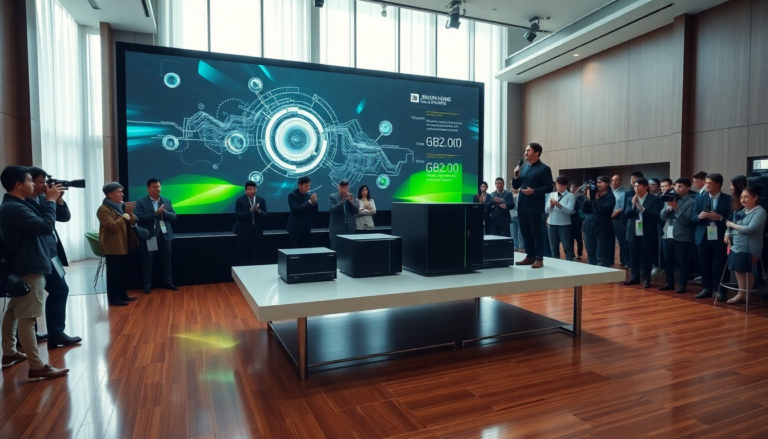Argomenti trattati
Nvidia’s CEO Jensen Huang recently took the stage at Computex 2025, unveiling groundbreaking advancements in artificial intelligence while also addressing the complexities of international trade policies affecting the tech industry. During a candid Q&A session with journalists, Huang shared his perspectives on Nvidia’s future innovations and the shifting landscape of the AI market.
AI advancements and the GB200 server
At the forefront of Huang’s presentation was the introduction of the GB200 server, a cutting-edge machine designed to propel enterprise-level AI capabilities to new heights. This server, equipped with multiple GPUs and advanced networking technology, is set to revolutionize how businesses deploy AI systems. Huang illustrated how the GB200 facilitates seamless integration with existing enterprise software, making it an attractive option for organizations looking to enhance their AI infrastructure.
With features like air cooling and high-speed networking capabilities, the GB200 server is positioned as a game changer for enterprises aiming to leverage AI for various applications, from virtual environments to complex data processing tasks. Huang emphasized the server’s compatibility with popular platforms such as VMware and Nutanix, underscoring Nvidia’s commitment to ensuring that its technology aligns with the needs of enterprise users.
Trade restrictions and their impact on Nvidia
During the discussion, Huang did not shy away from addressing the significant impact of trade restrictions, particularly those imposed by the Biden administration. He pointed out that these export controls have drastically reduced Nvidia’s market share in China, from 95% to approximately 50%. Despite these challenges, Huang remains optimistic, arguing that such restrictions have not effectively hindered China’s ability to develop its own competitive technologies.
Huang lamented the financial consequences of these trade policies, noting that they resulted in substantial write-offs for Nvidia, particularly concerning the H20 product line. He expressed his disappointment at the lack of tangible results from these restrictions, suggesting that they have inadvertently fueled local competition instead.
Future of AI and Nvidia’s global strategy
As the conversation progressed, Huang also touched on the future of AI technology and Nvidia’s role in shaping it. He highlighted the increasing importance of AI infrastructure worldwide, likening its growth to that of the internet. Huang believes that the demand for AI capabilities will only intensify in the coming years, as industries across the globe seek to integrate AI into their operations.
He also discussed Nvidia’s strategy for maintaining a competitive edge in the global market, particularly in response to the growing number of AI startups in China. Huang emphasized the necessity for Nvidia to adapt and innovate continually, ensuring that its products remain at the forefront of technological advancement.
Collaboration and the role of developers
Huang’s vision for the future encompasses a collaborative ecosystem where developers play a crucial role in driving AI innovation. He stressed the importance of providing developers with the tools they need to create and deploy AI applications efficiently. With products like the DGX Spark, Nvidia aims to empower developers to build their own AI supercomputers, reducing reliance on cloud services and fostering a more sustainable development environment.
Moreover, Huang pointed out that Nvidia’s CUDA programming model remains foundational for AI development, enabling a wide range of applications from machine learning to complex simulations. This flexibility positions Nvidia favorably within various sectors, as more organizations recognize the potential of AI to transform their operations.
Conclusion: A pivotal moment for Nvidia and AI
As Nvidia continues to navigate the complexities of the tech landscape, Huang’s insights at Computex 2025 signify a pivotal moment for the company and the broader AI industry. With innovative products on the horizon and a commitment to fostering collaboration among developers, Nvidia is poised to play a significant role in shaping the future of AI technology. The challenges posed by trade restrictions may be significant, but Huang’s optimism and strategic vision suggest that Nvidia will continue to thrive in an increasingly competitive environment.

